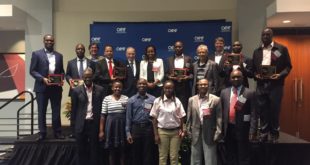Davis and Shirtliff reports soaring solar water heater sales.
High electricity costs, erratic power supplies, and new regulations, are driving exponential growth in the sales of solar-powered water heating, according to the country’s largest solar equipment supplier, David & Shirtliff.
The company today reported a close to doubling in its sales of Dayliff solar water heating systems in the last year – to both domestic and commercial clients, including hotels and schools – as newly gazetted Regulations for Residential & Commercial Buildings have required buildings that need more than 100litres of hot water a day to incorporate a solar hot water system.
The scale of the take-off coincides with reports that Kenya is emerging as a world leader in the adoption of solar equipment.
Davis & Shirtliff has rolled out a second generation of Dayliff solar water heating systems under the Kenyan solar power brand to make equipment even more accessible as a way for householders to save up to 60 per cent of their current utility bills. The new models feature indirect heating for mineralised water and greatly improved tanks with additional corrosion protection provided by cathodic protection.
The need for these kinds of smart energy solutions in the country was “acute”, said the company, and this had been the reason for launching the Kenyan branded heaters.
“Kenya is on the cusp of an energy transformation driven by soaring electricity bills and repetitive power outages, which together are seeing homes, offices, and even industries, switch to solar powered equipment,” said David Gatende Deputy Group CEO Davis and Shirtliff.
Conventional water heating is among the most intense consumers of electricity, typically consuming a sixth or more of Western utility bills. This makes it a prime target, at a time when Kenya’s power is in short Davis and Shirtliff reports soaring solar water heater sales
High electricity costs, erratic power supplies, and new regulations, are driving exponential growth in the sales of solar-powered water heating, according to the country’s largest solar equipment supplier, David &Shirtliff.
The company today reported a close to doubling in its sales of Dayliff solar water heating systems in the last year – to both domestic and commercial clients, including hotels and schools – as newly gazetted Regulations for Residential & Commercial Buildings have required buildings that need more than 100litres of hot water a day to incorporate a solar hot water system.
The scale of the take-off coincides with reports that Kenya is emerging as a world leader in the adoption of solar equipment.
Davis &Shirtliff has rolled out a second generation of Dayliff solar water heating systems under the Kenyan solar power brand to make equipment even more accessible as a way for householders to save up to 60 per cent of their current utility bills. The new models feature indirect heating for mineralised water and greatly improved tanks with additional corrosion protection provided by cathodic protection.
The need for these kinds of smart energy solutions in the country was “acute”, said the company, and this had been the reason for launching the Kenyan branded heaters.
“Kenya is on the cusp of an energy transformation driven by soaring electricity bills and repetitive power outages, which together are seeing homes, offices, and even industries, switch to solar powered equipment,” said David Gatende Deputy Group CEO Davis and Shirtliff.
Conventional water heating is among the most intense consumers of electricity, typically consuming a sixth or more of Western utility bills. This makes it a prime target, at a time when Kenya’s power is in short supply, for conversion to solar as a means of freeing Kenyan power for other uses and of cutting fossil fuel consumption and CO2 emissions. The United Nations Environment Programme reports that in Europe, a solar water heating system can meet 50 to 65 per cent of domestic hot water requirements, while in subtropical climates, the percentage can be up to 100 per cent of needs.
The Dayliff solar water systems are available in various tank sizes to suit most domestic and small scale institutional applications and offer a maintenance free system with a life span of up to 20 years.
The National Environmental Management Authority (NEMA) estimates the current demand for solar water heaters in Kenya at 65,000 units a year.
The independent analysis now citing Kenya as the world leader in the number of solar power systems installed per head – with more Kenyans now adopting solar power each year than make connections to the country’s electricity grid.
Dayliff heaters produce a minimum of 190 litres of hot water at 60º in a span of three to four hours on a sunny day. Systems are also supplied with a 3kW electric booster that serves as a back up in case of cloudy weather.
Globally, solar water heaters account for 0.5 per cent of energy used in water heating, a figure considered to be low considering it is the cheapest fuel option. The low uptake is attributed to the initially higher installation cost.
“But while the initial installation is more expensive, once you install a solar water heater, your water heating bills should drop 50%–80% and within 2 years you will have recovered your initial investment. Also, because the sun is free, you’re protected from future fuel shortages and price hikes,” said Mr Gatende.
Kenya Power in February stated conventional electricity demand was still rising, by a further 2 per cent in the last 8 months, putting ever more pressure on conventional power supplies already at maximum stretch and meaning that mainstream power prices may still go up further.
Davis and Shirtliff Limited is a Kenyan multinational, operating through a network of Kenyan branches and regional subsidiaries in Uganda, Tanzania, Zambia, Rwanda and Ethiopia. Founded in Kenya in 1946, it is the leading supplier of water related and alternative energy equipment in East Africa.
supply, for conversion to solar as a means of freeing Kenyan power for other uses and of cutting fossil fuel consumption and CO2 emissions. The United Nations Environment Programme reports that in Europe, a solar water heating system can meet 50 to 65 per cent of domestic hot water requirements, while in subtropical climates, the percentage can be up to 100 per cent of needs.
The Dayliff solar water systems are available in various tank sizes to suit most domestic and small scale institutional applications and offer a maintenance free system with a life span of up to 20 years.
The National Environmental Management Authority (NEMA) estimates the current demand for solar water heaters in Kenya at 65,000 units a year, with independent analysis now citing Kenya as the world leader in the number of solar power systems installed per head – with more Kenyans now adopting solar power each year than make connections to the country’s electricity grid.
Dayliff heaters produce a minimum of 190 litres of hot water at 60º in a span of three to four hours on a sunny day. Systems are also supplied with a 3kW electric booster that serves as a back up in case of cloudy weather.
Globally, solar water heaters account for 0.5 per cent of energy used in water heating, a figure considered to be low considering it is the cheapest fuel option. The low uptake is attributed to the initially higher installation cost.
“But while the initial installation is more expensive, once you install a solar water heater, your water heating bills should drop 50%–80% and within 2 years you will have recovered your initial investment. Also, because the sun is free, you’re protected from future fuel shortages and price hikes,” said Mr Gatende.
Kenya Power in February stated conventional electricity demand was still rising, by a further 2 per cent in the last 8 months, putting ever more pressure on conventional power supplies already at maximum stretch and meaning that mainstream power prices may still go up further.
Davis and Shirtliff Limited is a Kenyan multinational, operating through a network of Kenyan branches and regional subsidiaries in Uganda, Tanzania, Zambia, Rwanda and Ethiopia. Founded in Kenya in 1946, it is the leading supplier of water related and alternative energy equipment in East Africa.
 Fenesi.com Start, Run and Grow Your Business In Kenya
Fenesi.com Start, Run and Grow Your Business In Kenya





Pingback: Solar Water Heater On High Demand « Business « Kenyan News Portal